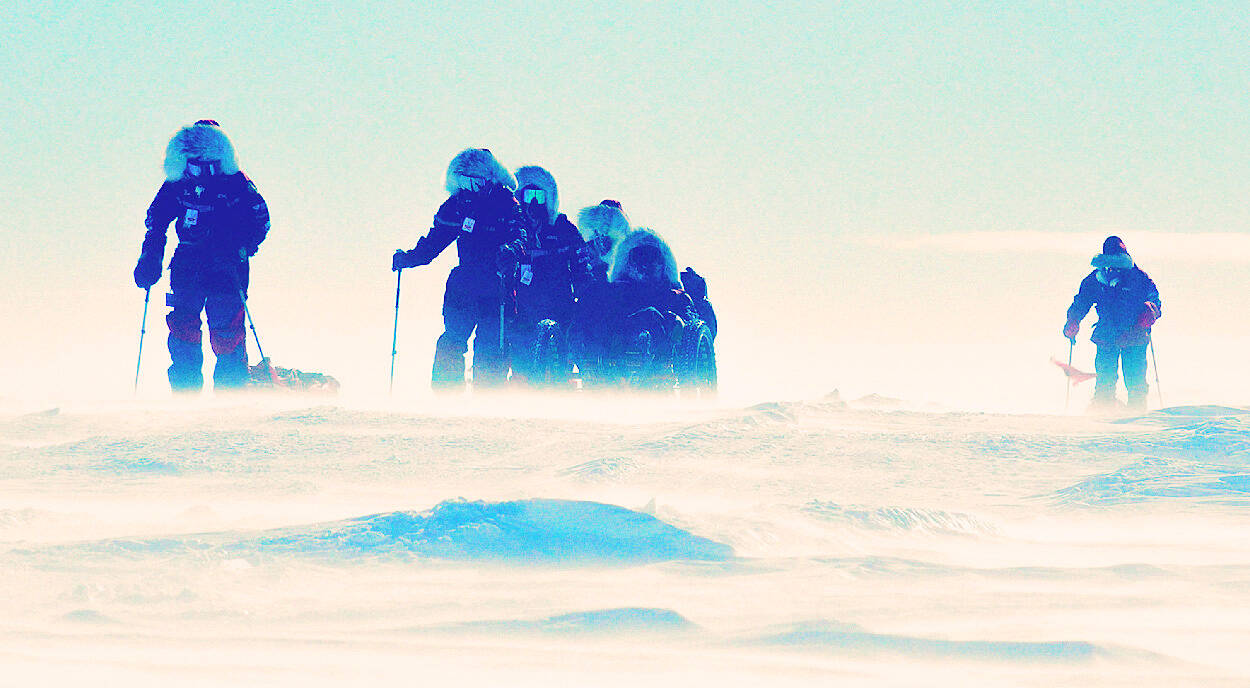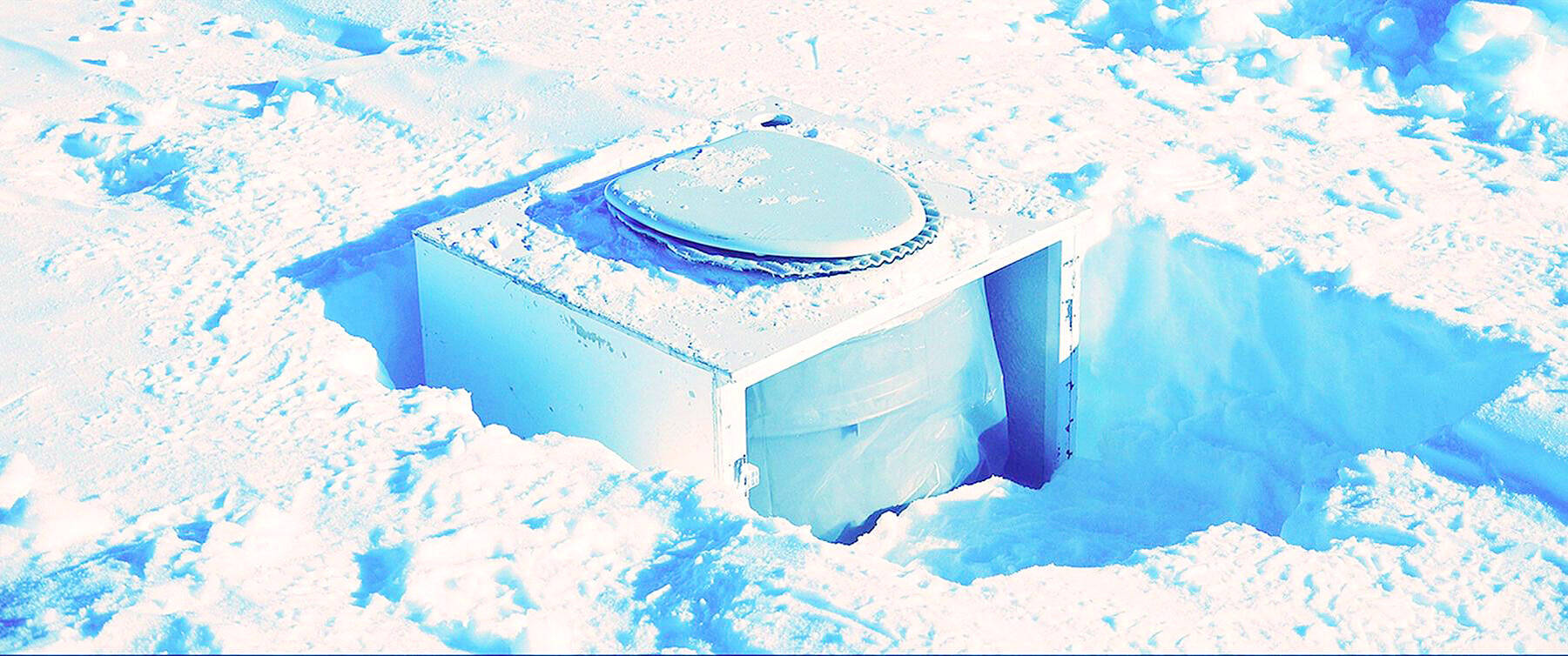Although Nature of Mother (無邊) features the first Taiwanese expedition to the south pole, it is hardly the main story. We do see some of the crew’s hardships and enjoy stunning shots of them trudging through the unforgiving, snow-blasted environment, but it’s really about director Yang Li-chou’s (楊力州) exploration of his inner demons and his relationship with his family.
The audience never really gets to know the team members, their backgrounds and their motivations behind the perilous 15-day endeavor, where they have to literally sign their lives away. The entire purpose of the trip is not clearly stated, and the few scenes featuring individual crew members are disjointed, as their emotions and situation mostly serve to segue into Yang’s reflections.
The serious mishaps, such as finding that they don’t have enough rations to finish the journey, are barely explained, nor how they eventually overcame the odds to make national history in December 2018. Even Yang losing his medication and equipment doesn’t seem like a big deal; we never learn why it happened or how he copes.

Photo courtesy of Backstage Studio
This inward-looking, contemplative setting is evident from the beginning, however, as the film opens with Yang giving a spirited presentation about his career that moves the audience to tears. Something is not right, however, as his voice fades in and out, and the footage is full of glitches that briefly cut to shots of space and the moon.
“But I don’t love myself,” he says in a voiceover.
Yang is best known for his hot-blooded, inspirational movies of underdog success — from the indigenous teens in 2006’s My Football Summer (奇蹟的夏天) to 2011’s Young at Heart: Grandma Cheerleaders (青春啦啦隊). His more recent, 18-part Weirdo Series (怪咖系列) minidocumentaries are also uplifting celebrations of those who strive to blaze their own paths.

Photo courtesy of Backstage Studio
Given the subject, one would expect Nature of Mother to follow the same vein, but it seems like Yang can’t do it anymore. He’s clearly haunted by something to the point of near-debilitation, and going on this journey of potentially no return seems to be his way of trying to deal with it. He juxtaposes the Taiwanese expedition with eerily jumbled footage from the doomed British Terra Nova Antarctic expedition of 1912, adding to the somber and ominous mood. The Antarctic landscape is otherworldly enough, and Yang’s treatment further pushes the film into the surreal, to the point where we forget that they’re in a life-and-death situation almost every day.
His words of despair float in and out of the story, along with faded scenes of his parents, wife and children. At one point he mentions that he wouldn’t mind if they never made it home; he later asks, “Why am I willing to die for my mother instead of living for my children?”
It’s quite heavy stuff, but it’s also poignant to see a well-known director bare his heart like this. It’s unclear if he finds what he needs in the South Pole, and perhaps this is just the beginning of him trying to face himself.
While other directors seem to be making their productions longer, too often for no apparent reason, Yang is going in the opposite direction. His previous feature, Love Without Clutching, Leave Without Guilt (愛別離苦), crammed the emotionally-charged stories of six women into 77 minutes; Nature of Mother clocks in at just exactly one hour.
It feels like just enough time for what Yang personally wants to say, but perhaps there could have been more room for the expedition and its intrepid crew members who went on the adventure of their lives.

The canonical shot of an East Asian city is a night skyline studded with towering apartment and office buildings, bright with neon and plastic signage, a landscape of energy and modernity. Another classic image is the same city seen from above, in which identical apartment towers march across the city, spilling out over nearby geography, like stylized soldiers colonizing new territory in a board game. Densely populated dynamic conurbations of money, technological innovation and convenience, it is hard to see the cities of East Asia as what they truly are: necropolises. Why is this? The East Asian development model, with

Desperate dads meet in car parks to exchange packets; exhausted parents slip it into their kids’ drinks; families wait months for prescriptions buy it “off label.” But is it worth the risk? “The first time I gave him a gummy, I thought, ‘Oh my God, have I killed him?’ He just passed out in front of the TV. That never happens.” Jen remembers giving her son, David, six, melatonin to help him sleep. She got them from a friend, a pediatrician who gave them to her own child. “It was sort of hilarious. She had half a tub of gummies,

The wide-screen spectacle of Formula One gets a gleaming, rip-roaring workout in Joseph Kosinski’s F1, a fine-tuned machine of a movie that, in its most riveting racing scenes, approaches a kind of high-speed splendor. Kosinski, who last endeavored to put moviegoers in the seat of a fighter jet in Top Gun: Maverick, has moved to the open cockpits of Formula One with much the same affection, if not outright need, for speed. A lot of the same team is back. Jerry Bruckheimer produces. Ehren Kruger, a co-writer on Maverick, takes sole credit here. Hans Zimmer, a co-composer previously, supplies the thumping

There is an old British curse, “may you live in interesting times,” passed off as ancient Chinese wisdom to make it sound more exotic and profound. We are living in interesting times. From US President Donald Trump’s decision on American tariffs, to how the recalls will play out, to uncertainty about how events are evolving in China, we can do nothing more than wait with bated breath. At the cusp of potentially momentous change, it is a good time to take stock of the current state of Taiwan’s political parties. As things stand, all three major parties are struggling. For our examination of the